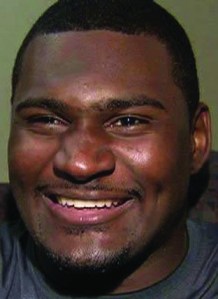HALL OF FAME SPOTLIGHT: Sturdivant reflects on sports journey
Quan Sturdivant’s athletic talent became evident in the mid-1990s as he proved to be a dominant participant on every youth sport team for which he rostered in the West Stanly area.

Quan Sturdivant
His athletic prowess continued as he participated in middle and high school sports, and clarified that his athletic journey would continue beyond that level, and his performance as a linebacker at the University of North Carolina led to his selection in the sixth round of the 2011 NFL draft by the Arizona Cardinals.
“My initial interest in sports were guys in the neighborhood,” he said, noting Isaac Sturdivant in particular with sparking his interest in all things athletic.
Sturdivant also credited a number of adults in the Oakboro and West Stanly areas with influencing his youth sports experiences.
“Mike Burleson, Kim Huntley and John David Smith were some of the folks that encouraged me to play hard and enjoy whatever sport I was playing,” Sturdivant said.
In high school Sturdivant stood out on the football field at West Stanly, but he also played basketball and baseball.
Despite his imposing size, he made his mark as a quarterback on the Colt football squads, capping a stellar senior year completing 99 of 179 passes (55.3%) for 1,794 yards and 21 touchdowns, In addition, he rushed 111 times for 745 yards. He completed his high school career as a three-time all conference and two-time all-state player, in addition to being named conference player of the year as a senior.
Sturdivant credited a number of Colt coaches with his development as both a player and a person, mentioning in particular former head football coach Rich Williams, in addition to basketball coach Rudi Heath and baseball coach David Lee.
At UNC, Sturdivant’s size and mobility led the coaching staff to shift him to the defensive side of the ball, on which he started five times and played in all 12 of the team’s games at outside linebacker as a true freshman in 2006. As a sophomore, he continued his development, playing in all 13 of the Tarheels’ games and recording 122 tackles (87 solo), two sacks, one forced fumble and two interceptions, earning honorable mention All-American recognition by Sports Illustrated.
Sturdivant is quick to credit then-UNC coaches Butch Davis, Tommy Thigpen and Art Kaufman.
“They were influential in helping me grow as a football player,” he said.
After being moved to middle linebacker during his junior season, Sturdivant caught the attention of NFL scouts and was drafted in the sixth round of the league’s 2011 draft (171st overall) by the Arizona Cardinals. He was later traded to the Kansas City Chiefs and completed his career with Washington.
With professional sports behind him, Sturdivant continues to contribute to the game he loves, having served as an assistant football coach at Anson High School in recent years.
He sees sports as being a valuable opportunity for youngsters to develop into productive adults.
“I think the most important lesson youngsters can learn from sports is being accountable,” he said. “In addition, being a good teammate, giving your all every day in life and learning to deal with adversity are all lessons that athletics can teach.”
Sturdivant also believes that youngsters should avoid specializing in sports at early ages.
“One negative I see in youth sports, and even high school sports, is that kids just concentrate on one sport,” Sturdivant said, adding, “each sport has different movements and skill sets that translate to each other.”
Sturdivant is one of five persons who will be inducted into the Stanly County Sports Hall of Fame on July 17 at Pfeiffer University.
Tickets to the induction ceremony are available for $35 in advance at Albemarle City Hall, Albemarle Parks and Recreation (Jesse F. Niven Center / E. E. Waddell Center, Starnes-Bramlett Jewelers, Uwharrie Dash, Locust Town Hall and Oakboro Town Hall.

